From Our Man in Charleston: Britain's Secret Agent in the Civil War South, to be published July 21:
Seward
saw spies everywhere, and his spies were
everywhere. His police, informants, and private detectives kept a constant flow
of information and allegations piling onto his desk. Legal guarantees
for
suspected traitors and spies were thrown out. When William Howard Russell met with Seward in July he
accused him of running what amounted to a police state, and Seward was
unapologetic. “The government will not shrink from using all the means which
they consider necessary to restore the Union.” But as word got back to London
of Seward’s activities, Palmerston raged against the effrontery of it all.
“These North Americans,” he said, “are following fast the example of the
Spanish Americans and the Continental despots. They commit all sorts of
violence without regard to law, take up men and women and imprison them on mere
suspicion, and rule the land by spies and police and martial law.” …
Lyons
was worried. The secret mission to Richmond was approaching, but his man was
already under scrutiny. “Her Majesty’s Government does not wish for an éclat here, so be particularly careful
to avoid bringing one on, either as respects yourself or me,” Lyons warned
Bunch on July 6. “They have
already got stories about you and the persons to whom you have given passports
to the North, which I shall do all I can to put straight. They make it
necessary for you to be particularly cautious.”At about the same time, Lyons
wrote to Russell that he saw “symptoms of a determination here to make [Bunch]
an object of attack. To withdraw his exequator would be just the sort of
half-violent measure which would, I am afraid, be to Mr. Seward’s taste. It
would not be an absolutely brutem fulmen
[empty threat], for his recognized official character is necessary to enable
him to communicate with the U.S. Blockading Squadron, and to obtain respect for
messengers sent to and from him with dispatches.” Lyons concluded by saying, “I
have no doubt he will manage the negotiations about the Declaration of Paris as
well and as prudently as any man.” But the secrecy around the mission to
Richmond was compromised before it ever started.
Seward on the cover of "Harper's Weekly" soon after he took office, courtesy of The American Library of Paris










